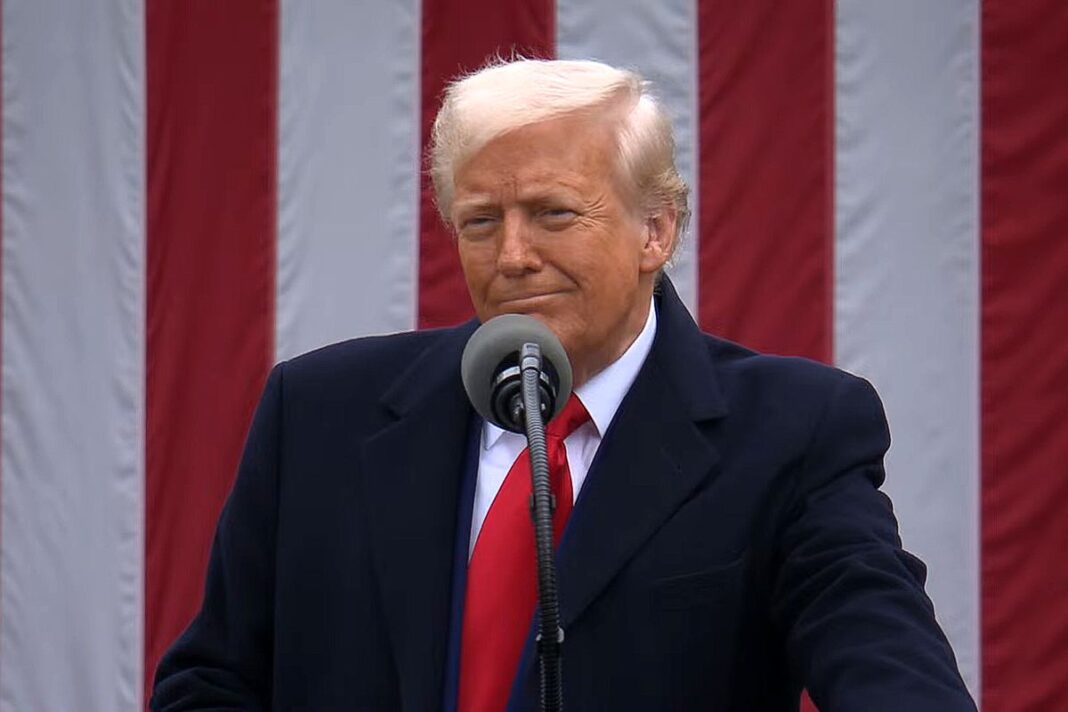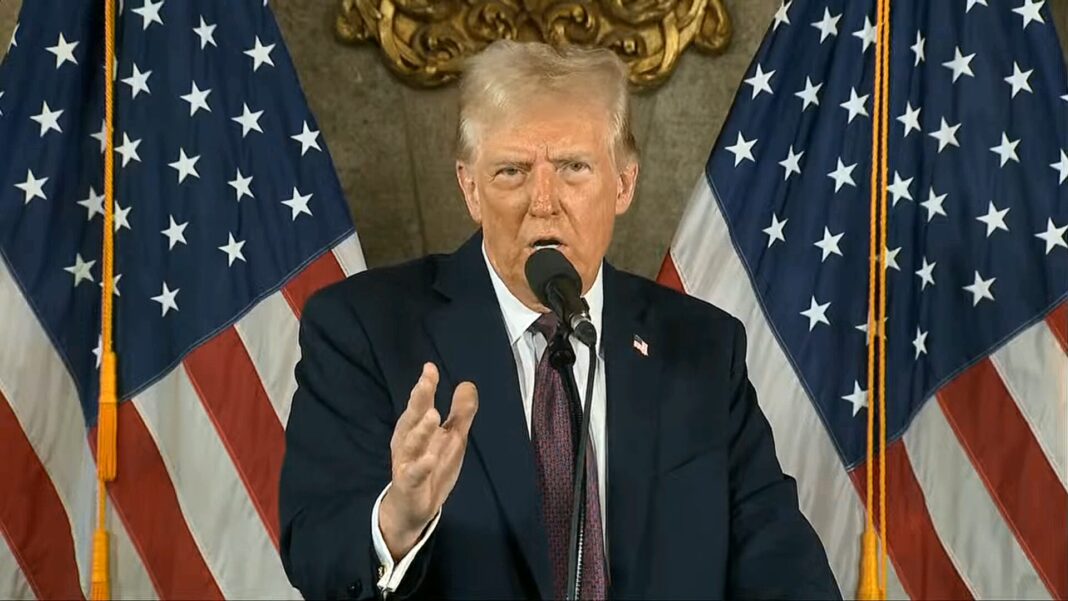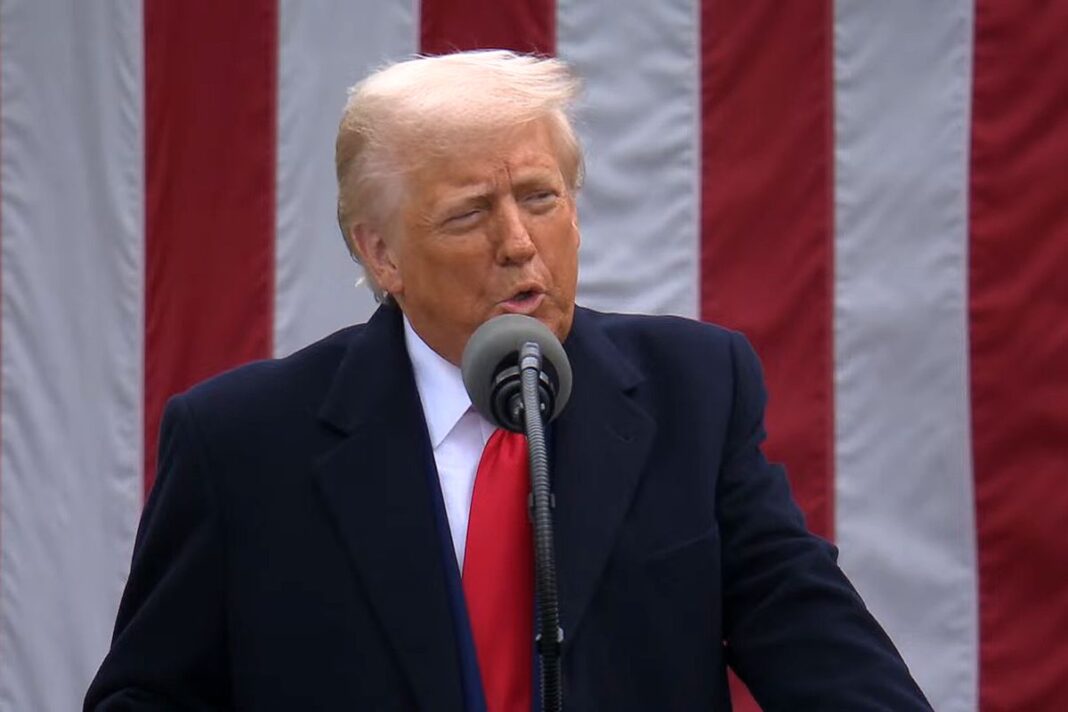The United States will impose blanket tariffs on all countries plus higher levies for some countries, Trump announced.
Trump to Impose ‘Discounted’ Reciprocal Tariffs on Countries With High Trade Barriers
During his speech, Trump showed a chart of planned reciprocal tariffs on several U.S. trading partners.
“China, 67 percent—that’s tariffs charged to the USA, including currency manipulation and trade barriers,” he said. “So 67 percent, [we’re] charging a discounted reciprocal tariff of 34 percent” to China.
The European Union, which Trump said charges the United States 39 percent in tariffs, will receive 20 percent reciprocal tariffs.
“They’re very tough, very, very tough traders. You know, you think of [the] European Union, very friendly. They rip us off. It’s so sad to see,” Trump said.
Taiwan, which charges the United States 64 percent in tariffs, will likewise see a reciprocal tariff of 32 percent.
A minimum baseline tariff of 10 percent will also be imposed on all U.S. trading partners. “That’ll be on other countries to help rebuild our economy and to prevent cheating,” Trump said.
“Foreign nations will finally be asked to pay for the privilege of access to our market—the biggest market in the world.”
Trump Says New Tariffs Policy Puts Americans First
WASHINGTON—President Donald Trump said during his announcement of reciprocal tariffs that “we’re standing up for the American worker, and we are finally putting America first.”
Trump outlined the disparity between tariffs charged by and charged to the United States, pointing out that the inequality occurs despite the fact that the United States supports other nations’ military and other endeavors.
According to the president, the new tariffs will cause a big financial turnaround.
“We’re going to be wealthy as a country because they’ve taken so much of our wealth away from us,” Trump said.
“We truly can be very wealthy. We can be so much wealthier than any country, it’s not even believable.”
Trump: Days of Unfair Trade ‘Are Over’
Trump rattled off a list of examples in which he said the United States had been ripped off on trade, vowing that “those days are over.”
On motorcycle imports, he noted, the United States charges other countries a 2.4 percent tariff.
“Meanwhile, Thailand and others are charging much higher prices, like 60 percent, India charges 70 percent, Vietnam charges 75 percent, and others are even higher than that,” Trump said.
He also pointed to car imports. He noted that the United States “for decades” has only charged a 2.5 percent tariff on foreign-made cars compared to much higher rates imposed by the European Union, India, South Korea, and Japan on American cars.
“Such horrendous imbalances have devastated our industrial base and put our national security at risk,” Trump said.
He blamed “former presidents and past leaders who weren’t doing their job” for the disparity.
“They let it happen, and they let it happen to an extent that nobody can even believe,” he said.
“That’s why, effective at midnight, we will impose a 25 percent tariff on all foreign-made automobiles.”
Trump to Sign Order on Reciprocal Tariffs
In a speech at the White House Rose Garden on Wednesday, President Donald Trump said he would be signing an executive order implementing new reciprocal tariffs on U.S. trading partners
“In a few moments, I will sign a historic executive order instituting reciprocal tariffs on countries throughout the world,” Trump said.
“For decades, the United States slashed trade barriers on other countries, while those nations placed massive tariffs on our products and created outrageous non-monetary barriers to decimate our industries,” he said.
As previously announced, Trump said 25 percent tariffs on foreign-made automobiles will go into effect at midnight.
Tillis ‘Not Supporting’ Kaine Resolution
WASHINGTON—Sen. Thom Tillis (R-N.C.) is not supportive of a resolution that would block President Donald Trump’s tariffs on Canadian goods.
Tillis told reporters assembled outside the Senate chambers that the welfare of America’s farmers is a critical element in the tariff conversation.
He said farmers have endured plenty of financial upheaval recently. Any moves that could shut U.S. agricultural exports out of foreign markets must be made with that consequence in mind.
“We have to be very, very cognizant of that,” Tillis said.
‘I Won’t Be a Rubber Stamp on Anything’: Sen. Justice
‘I Won’t Be a Rubber Stamp on Anything’: Sen. Justice
WASHINGTON—Ahead of a Senate vote to nullify President Donald Trump’s tariffs on Canada, Sen. Jim Justice (R-W.Va.) told reporters he won’t be a “rubber stamp” for his party but will instead vote the way he thinks is “the smartest way.”
On Wednesday, Sen. Tim Kaine (D-Va.) introduced a resolution that would block the White House from imposing trade restrictions with foreign countries.
In comments made outside the Senate chambers, the junior senator and former Mountain State governor said the current structure of the automotive industry in the United States speaks to the current problems with the country’s role in the international economy.
Right now, Justice said, only a quarter of cars sold in the United States are wholly made from American components and assembled in the country.
“What we are is just an assembler of a bunch of expensive parts from all kinds of other countries, and that is not any good,” Justice said. “We need to bring manufacturing back to the United States.”
Tariffs could be “one of the tools” to achieve that goal, he said.
Vietnam Cuts Import Duties for US Products
Vietnam has announced reductions to tariffs on a range of U.S. products.
“From March 31, 2025, certain items such as cars, wood, ethanol, frozen chicken legs, pistachios, almonds, fresh apples, cherries, raisins, etc., will be subject to a new preferential import duty rate,” the government said in a statement on Monday.
The tariff rate on liquefied natural gas (LNG), for example, has been lowered from 5 percent to 2 percent. Import duties on some American-made automobiles were cut in half, and levies on frozen chicken legs have been slashed from 20 percent to 15 percent.
Last month, Vietnamese Prime Minister Pham Minh Chinh ordered a review of the nation’s levies to bolster imports of U.S. goods and cushion potential economic blows from President Donald Trump’s reciprocal tariffs.
According to the United States Trade Representative, the U.S. goods trade deficit with Vietnam was $123.5 billion in 2024, up more than 18 percent from the previous year. This is the third-highest in the world, behind China ($295 billion) and Mexico ($172 billion).
In the aftermath of the COVID-19 pandemic, Vietnam emerged as a crucial market in the global supply chain as many companies have shifted their manufacturing from China.
Meanwhile, an increasing number of nations have begun rolling back their tariffs on U.S. goods. India has signaled it could lower tariffs on more than half of U.S. imports, while Israel is set to eliminate its remaining tariffs on U.S. exports.
Trump’s Tariffs on Canada ‘Detrimental’ to Maine: Sen. Collins
Sen. Susan Collins (R-Maine) says President Donald Trump’s tariffs on Canadian goods will be “detrimental” to families and local economies.
In remarks on the Senate floor, Collins expressed support for a resolution—S.J. Res. 37—overturning the president’s emergency order to impose tariffs on the northern neighbor.
She called Canada a crucial trading partner for her state as it provides home heating oil, gasoline, jet fuel, and other refined petroleum products.
“The Maine economy is integrated with Canada,” Collins said.
While she shares the concern about the flow of fentanyl into the United States, she noted the majority of the dangerous drug comes through the southern border.
“Our Canadian neighbors are working collaboratively and cooperatively with our government to stop that trafficking,” Collins added.
‘It’s Recession Day’: Rep. Hakeem Jeffries
President Donald Trump’s tariffs will send the U.S. economy into a recession, according to House Minority Leader Hakeem Jeffries (D-N.Y.).
“Republicans are crashing the American economy in real time and driving us to a recession,” Jeffries told reporters at a news conference. “It’s not Liberation Day. It’s recession day in the United States of America.”
Jeffries said the president and GOP lawmakers have failed to employ measures to lower the high cost of living.
“Donald Trump, Elon Musk, and extreme MAGA Republicans are on the run. On the run on the economy. On the run, legislatively,” he added.
Jeffries made the remarks hours before Trump is set to unveil the contours of his sweeping tariff plans at a “Make America Wealthy Again” event at the White House Rose Garden.
Over the last several weeks, investors and economists have feared that tariffs will revive inflation and weigh on economic growth prospects.
The Federal Reserve Bank of Atlanta estimates the U.S. economy will contract 1.4 percent in the first quarter, after adjusting for gold imports and exports.
Trump has shrugged off recession concerns.
“I don’t see it at all,” he told reporters outside the White House last month. “I think this country is going to boom. I think we’re going to have the greatest markets we’ve ever had.”
Senate to Vote on Measure to Nullify Trump’s Tariffs on Canada
The Senate is set to vote on a measure that could overturn President Donald Trump’s tariffs on Canadian goods.
Sen. Tim Kaine (D-Va.) introduced a resolution—S.J. Res. 37—eliminating the 1977 International Emergency Economic Powers Act (IEEPA). The decades-old law permits the president to impose trade restrictions with foreign countries during a declared national emergency.
In February, Trump invoked the IEEPA Act to justify imposing tariffs on Canada, Mexico, and China, alleging drug trafficking and illegal immigration threats from the three countries.
Senate Democrats have sought to undo Trump’s 25 percent tariff on Canada, warning that the president’s levies will raise prices, affect workers, and hurt trade relations.
The bill would need the support of all Democrats and four Republicans. It’s a symbolic vote because the measure cannot be taken up in the House due to a rule House Republicans adopted last month.
Sen. Rand Paul (R-Ky.), a vocal opponent of tariffs, is a cosponsor of the legislation.
In addition, Sen. Susan Collins (R-Maine) has expressed support for the bill, telling reporters she is worried that higher import duties would harm her state. Annual Maine–Canada trade is about $8 billion.
Trump urged GOP members, including Sens. Mitch McConnell (R-Ky.) and Lisa Murkowski (R-Alaska), to “hopefully get on the Republican bandwagon” and vote against the bill.
“They are playing with the lives of the American people, and right into the hands of the Radical Left Democrats and Drug Cartels,” Trump said in an April 2 Truth Social post.
The president pointed out that the measure would not pass in the House due to a provision added during the funding dispute to restrict efforts to eliminate his tariffs, and he would not sign it if it made it to his desk.
Mexico Will Not Impose Retaliatory Tariffs on US, Sheinbaum Says
Mexican President Claudia Sheinbaum will not implement retaliatory tariffs on the United States.
Ahead of President Donald Trump’s “liberation day” announcement that will unveil sweeping tariffs on U.S. trading partners, the Mexican leader confirmed that she will outline a “comprehensive plan, not a tit-for-tat on tariffs” on April 3.
“It’s not a question of if you impose tariffs on me, I’m going to impose tariffs on you,” Sheinbaum said at an April 2 news briefing. “Our interest is in strengthening the Mexican economy.”
The Wilson Center, a Washington-based think tank, forecast that Trump’s 25 percent tariffs on Mexican goods could result in a 4 percent GDP hit to Mexico’s economy.
Last week, Trump announced a 25 percent tariff on all automobiles and car parts not manufactured in the United States. Mexico exports approximately 3 million vehicles to the United States per year.
Sheinbaum recently told reporters that there “should be no tariffs” within the United States–Mexico–Canada Agreement (USMCA), which is scheduled for a review in 2026.







